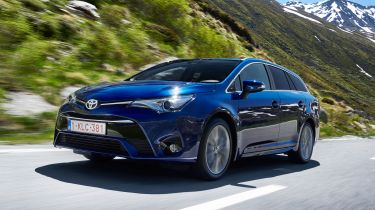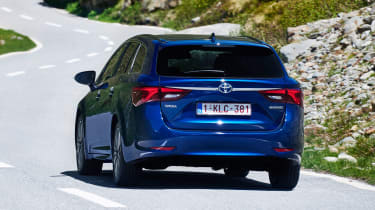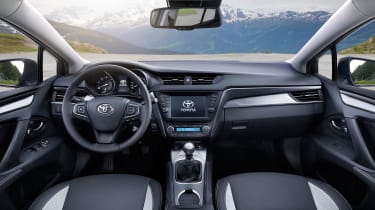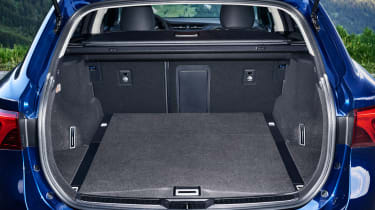New Toyota Avensis Touring Sports review
Fleet favourite Toyota Avensis gets a comprehensive update, with new looks, engines and tech

The new Toyota Avensis is essentially a comprehensive update of the old car, rather than a totally new next-generation model. It makes improvements across the board, and while it’s still not quite good enough to challenge the class-leading VW Passat, it represents incredible value for money, while also being cheaper to run than before. The new 1.6 diesel is a bit sluggish, though the larger 2.0-litre is faster and more flexible if you value performance as well as running costs.
A massive 87 per cent of Toyota Avensis sales go to the fleet market. Toyota knows this, and has tweaked its age-old family car – with updated styling, more kit and cleaner engines – to further appeal to business users.
Visual changes are actually quite extensive. While it’s still recognisable as an Avensis, the entire front end has been remoulded to echo the smaller Yaris and updated Auris, with an X-shaped grille and bumper design, and larger air intakes. All cars get LED daytime running lights, while at the rear the LED light clusters are standard across the range. There are new alloy wheel designs, and the side sills have been adapted to give the Avensis a perceived lower centre of gravity.
Used - available now

2022 Mercedes
GLC
35,715 milesAutomaticDiesel2.0L
Cash £30,587
2021 Mazda
CX-5
14,540 milesManualPetrol2.0L
Cash £19,887
2023 Land Rover
Range Rover Evoque
20,056 milesManualDiesel2.0L
Cash £21,787
2022 Kia
e-Niro
54,760 milesAutomaticElectric
Cash £15,287To stay competitive in a strongly fought market, Toyota hopes to fend off advances from the new Ford Mondeo and Volkswagen Passat by also introducing a pair of new, BMW-derived diesel engines.
Carried over from the previous-generation MINI Cooper D, this 1.6-litre D-4D engine gets just 110bhp, but an adequate 270Nm of torque. It’s the same unit fitted to Toyota’s very own Verso last year, replacing the slightly more powerful 2.0-litre diesel from the old Avensis.
Performance is acceptable, if a little underwhelming. The 0-62mph sprint takes 11.7 seconds and maximum torque comes in from 1,750rpm. However, it only lasts until 2,250rpm, meaning you need to stay within a very tight rev band if you want to make decent progress. We tested the car on a series of tight and twisting roads and found ourselves changing gear more than we’d like, often shifting down when with rival engines you’d happily push on without swapping cogs.
If performance is a priority, the larger 2.0-litre diesel (which replaces the 2.2 D-4D) is much more flexible, and offers a noticeable performance improvement when pulling off motorway slip roads and out of tight junctions.
The 1.6 is nicely refined at a cruise, and for most buyers that’s exactly what they want. This is a car designed to sit at 70mph all day long, and we’ve no complaints about its long distance ability. In fact, we found it impressively quiet at motorway speeds, with only a little road noise and a slight wind whistle from the door mirrors.
The ride is good, too. While it isn’t as fun to drive as a Mazda 6, the dampers have been tightened and it doesn’t roll too much in the bends. The steering could do with a bit more feel, but it has a decent weight to it and doesn’t push wide if you approach a tight corner carrying a too much speed. The brakes in our 1.6 test car felt a little spongy, but the 2.0-litre we tried was much better, so it’s likely they just needed bedding in.
Downsizing has made the Avensis more efficient, too. Where the 2.0-litre diesel emitted 120g/km of CO2, this new 1.6 cuts that figure to 110g/km, meaning it drops two company car tax bands, from 22 to 20 per cent BiK. However, a new BMW 320d EfficientDynamics betters this still, at 17 per cent BiK.
The Avensis – in both saloon and more practical Sports Touring guises – will return 67.3mpg. That’s no mean feat, but a VW Passat BlueMotion Estate should do 76.3mpg, and is almost a second faster to 62mph.
Kit is impressive though. The mid-range Avensis Business Edition costs £21,995 – or £23,175 for this Touring Sports estate model – and comes with a list of equipment longer than your right arm. Automatic high beams, lane departure warning and road sign recognition all make long distance driving easier, while things like touchscreen sat-nav, DAB, automatic air-con, rain sensing wipers and automatic headlights are all standard. You’ll also find 17-inch alloy wheels, half Alcantara seats and a reversing camera on the extensive kit list. A mid-spec Mondeo Titanium costs almost £1,500 more.
Interior quality is a step-up from the previous Avensis, too. The buttons and switches have a decent weight to them, and everything feels logically laid out. The infotainment system is a little dated, though, and there are some nasty plastics on the centre console.
Practicality is unchanged, meaning the Toyota’s boot measures in at 543 litres, or 1,609 litres with the rear seats folded flat – a Passat Estate betters this with 650 litres and 1,780 litres. Despite this, the load floor is almost totally flat, and there’s enough space on the rear bench to sit three abreast. There aren’t as many cubbies and storage places inside as you’ll find on rivals, but the glovebox is huge.
All Avensis models are now safer, too – with autonomous emergency braking and a pre-crash safety system as standard. Engineers have openly admitted they’re hoping for the full five stars from Euro NCAP when the Avensis is tested in the next few weeks.











